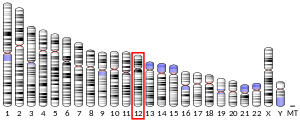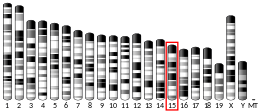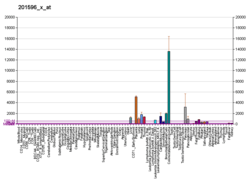Keratin 18
Keratin 18 is a type I cytokeratin. It is, together with its filament partner keratin 8, perhaps the most commonly found products of the intermediate filament gene family. They are expressed in single layer epithelial tissues of the body. Mutations in this gene have been linked to cryptogenic cirrhosis. Two transcript variants encoding the same protein have been found for this gene.[5]
Keratin 18 is often used together with keratin 8 and keratin 19 to differentiate cells of epithelial origin from hematopoietic cells in tests that enumerate circulating tumor cells in blood.[6]
Interactions
Keratin 18 has been shown to interact with Collagen, type XVII, alpha 1,[7] DNAJB6,[8] Pinin[9] and TRADD.[10]
gollark: ... no?
gollark: ????
gollark: Even if someone comes up with a complete theory explaining the interaction of every subatomic particle or whatever of the universe, that doesn't mean you can control it.
gollark: Well, that's not true.
gollark: It lead to a bit of a lack of neutrality.
References
- GRCh38: Ensembl release 89: ENSG00000111057 - Ensembl, May 2017
- GRCm38: Ensembl release 89: ENSMUSG00000023043 - Ensembl, May 2017
- "Human PubMed Reference:". National Center for Biotechnology Information, U.S. National Library of Medicine.
- "Mouse PubMed Reference:". National Center for Biotechnology Information, U.S. National Library of Medicine.
- "Entrez Gene: KRT18 keratin 18".
- W. Jeffrey Allard; Jeri Matera; M. Craig Miller; et al. (October 2004). "Tumor Cells Circulate in the Peripheral Blood of All Major Carcinomas but not in Healthy Subjects or Patients With Nonmalignant Diseases". Clinical Cancer Research. 10 (20): 6897–6904. doi:10.1158/1078-0432.CCR-04-0378. PMID 15501967.
- Aho, S; Uitto J (March 1999). "180-kD bullous pemphigoid antigen/type XVII collagen: tissue-specific expression and molecular interactions with keratin 18". J. Cell. Biochem. 72 (3): 356–67. doi:10.1002/(SICI)1097-4644(19990301)72:3<356::AID-JCB5>3.0.CO;2-M. ISSN 0730-2312. PMID 10022517.
- Izawa, I; Nishizawa M; Ohtakara K; Ohtsuka K; Inada H; Inagaki M (November 2000). "Identification of Mrj, a DnaJ/Hsp40 family protein, as a keratin 8/18 filament regulatory protein". J. Biol. Chem. 275 (44): 34521–7. doi:10.1074/jbc.M003492200. ISSN 0021-9258. PMID 10954706.
- Shi, J; Sugrue S P (May 2000). "Dissection of protein linkage between keratins and pinin, a protein with dual location at desmosome-intermediate filament complex and in the nucleus". J. Biol. Chem. 275 (20): 14910–5. doi:10.1074/jbc.275.20.14910. ISSN 0021-9258. PMID 10809736.
- Inada, H; Izawa I; Nishizawa M; Fujita E; Kiyono T; Takahashi T; Momoi T; Inagaki M (October 2001). "Keratin attenuates tumor necrosis factor-induced cytotoxicity through association with TRADD". J. Cell Biol. 155 (3): 415–26. doi:10.1083/jcb.200103078. ISSN 0021-9525. PMC 2150850. PMID 11684708.
Further reading
- Omary MB, Baxter GT, Chou CF, et al. (1992). "PKC epsilon-related kinase associates with and phosphorylates cytokeratin 8 and 18". J. Cell Biol. 117 (3): 583–93. doi:10.1083/jcb.117.3.583. PMC 2289443. PMID 1374067.
- Waseem A, Gough AC, Spurr NK, Lane EB (1990). "Localization of the gene for human simple epithelial keratin 18 to chromosome 12 using polymerase chain reaction". Genomics. 7 (2): 188–94. doi:10.1016/0888-7543(90)90540-B. PMID 1693358.
- Heath P, Elvin P, Jenner D, et al. (1990). "Localisation of a cDNA clone for human cytokeratin 18 to chromosome 17p11-p12 by in situ hybridisation". Hum. Genet. 85 (6): 669–70. doi:10.1007/BF00193596. PMID 1699878.
- Waseem A, Alexander CM, Steel JB, Lane EB (1991). "Embryonic simple epithelial keratins 8 and 18: chromosomal location emphasizes difference from other keratin pairs". New Biol. 2 (5): 464–78. PMID 1705144.
- Romano V, Hatzfeld M, Magin TM, et al. (1986). "Cytokeratin expression in simple epithelia. I. Identification of mRNA coding for human cytokeratin no. 18 by a cDNA clone". Differentiation. 30 (3): 244–53. doi:10.1111/j.1432-0436.1986.tb00787.x. PMID 2422083.
- Oshima RG, Millán JL, Ceceña G (1987). "Comparison of mouse and human keratin 18: a component of intermediate filaments expressed prior to implantation". Differentiation. 33 (1): 61–8. doi:10.1111/j.1432-0436.1987.tb01542.x. PMID 2434380.
- Leube RE, Bosch FX, Romano V, et al. (1987). "Cytokeratin expression in simple epithelia. III. Detection of mRNAs encoding human cytokeratins nos. 8 and 18 in normal and tumor cells by hybridization with cDNA sequences in vitro and in situ". Differentiation. 33 (1): 69–85. doi:10.1111/j.1432-0436.1986.tb00412.x. PMID 2434381.
- Kulesh DA, Oshima RG (1988). "Cloning of the human keratin 18 gene and its expression in nonepithelial mouse cells". Mol. Cell. Biol. 8 (4): 1540–50. doi:10.1128/MCB.8.4.1540. PMC 363314. PMID 2454392.
- Sémat A, Vasseur M, Maillet L, et al. (1988). "Sequence analysis of murine cytokeratin endo A (no. 8) cDNA. Evidence for mRNA species initiated upstream of the normal 5' end in PCC4 cells". Differentiation. 37 (1): 40–6. doi:10.1111/j.1432-0436.1988.tb00794.x. PMID 2454862.
- Kulesh DA, Oshima RG (1989). "Complete structure of the gene for human keratin 18". Genomics. 4 (3): 339–47. doi:10.1016/0888-7543(89)90340-6. PMID 2469635.
- Ku NO, Omary MB (1994). "Identification of the major physiologic phosphorylation site of human keratin 18: potential kinases and a role in filament reorganization". J. Cell Biol. 127 (1): 161–71. doi:10.1083/jcb.127.1.161. PMC 2120194. PMID 7523419.
- Liao J, Lowthert LA, Ghori N, Omary MB (1995). "The 70-kDa heat shock proteins associate with glandular intermediate filaments in an ATP-dependent manner". J. Biol. Chem. 270 (2): 915–22. doi:10.1074/jbc.270.2.915. PMID 7529764.
- Yoon SJ, LeBlanc-Straceski J, Ward D, et al. (1995). "Organization of the human keratin type II gene cluster at 12q13". Genomics. 24 (3): 502–8. doi:10.1006/geno.1994.1659. PMID 7536183.
- Ku NO, Omary MB (1995). "Identification and mutational analysis of the glycosylation sites of human keratin 18". J. Biol. Chem. 270 (20): 11820–7. doi:10.1074/jbc.270.20.11820. PMID 7538124.
- Neumaier M, Gerhard M, Wagener C (1995). "Diagnosis of micrometastases by the amplification of tissue-specific genes". Gene. 159 (1): 43–7. doi:10.1016/0378-1119(94)00522-T. PMID 7541767.
- Maruyama K, Sugano S (1994). "Oligo-capping: a simple method to replace the cap structure of eukaryotic mRNAs with oligoribonucleotides". Gene. 138 (1–2): 171–4. doi:10.1016/0378-1119(94)90802-8. PMID 8125298.
- Liao J, Lowthert LA, Ku NO, et al. (1996). "Dynamics of human keratin 18 phosphorylation: polarized distribution of phosphorylated keratins in simple epithelial tissues". J. Cell Biol. 131 (5): 1291–301. doi:10.1083/jcb.131.5.1291. PMC 2120635. PMID 8522590.
- Ku NO, Wright TL, Terrault NA, et al. (1997). "Mutation of human keratin 18 in association with cryptogenic cirrhosis". J. Clin. Invest. 99 (1): 19–23. doi:10.1172/JCI119127. PMC 507762. PMID 9011570.
- Ji H, Reid GE, Moritz RL, et al. (1997). "A two-dimensional gel database of human colon carcinoma proteins". Electrophoresis. 18 (3–4): 605–13. doi:10.1002/elps.1150180344. PMID 9150948.
This article is issued from Wikipedia. The text is licensed under Creative Commons - Attribution - Sharealike. Additional terms may apply for the media files.




